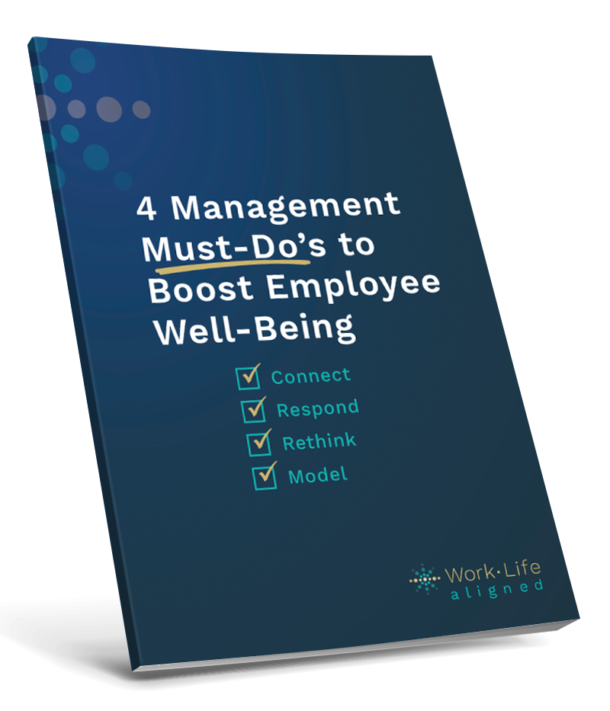Research
A Program Grounded in Nearly Three Decades of Research and Empirical Evidence
Designed With Your Learners in Mind
Research proves an employee’s ability to align their work and personal responsibilities hinges on the extent to which people managers demonstrate four specific strategies. It also shows that managers who consistently demonstrate these strategies positively impact employee engagement, retention, and well-being.
Utilizing the research and evidence gathered by collaborators Dr. Ellen Ernst Kossek and Dr. Leslie Hammer, this program focuses on the manager behaviors that make a real difference in employees’ work-life alignment.
Dr. Kossek and Dr. Hammers’s research has been featured in national and international media such as the Harvard Business Review, Financial Times, National Public Radio, Wall Street Journal, Forbes, Time, and the Washington Post.


What Working Parents Need From Their Managers
— Harvard Business Review
Kossek, Wilson, and and Rosokha (2020)
The latest research on how the pandemic is putting an enormous strain on working parents and the new challenge that poses for their managers. The authors share how supervisors can offer much-needed consistency and predictability for working parents on their teams. They also outline specific ways to give working parents more flexibility while still holding them accountable.
NEW
Pushing the Boundaries: A Qualititative Study of How Stem Women Adapted to Disrupted Work–Nonwork Boundaries During the COVID-19 Pandemic
— Journal of Applied Psychology
Kossek, Dumas, Piszczek, and Allen (2021)
National reports widely publicized how the COVID pandemic impacted women’s careers negatively, as many exited their jobs to manage nonwork demands. We know less about the adaptations made by highly career-invested women to remain in the workforce in occupations where they are extremely under-represented. Based on qualitative data from 763 academic Science, Technology, Engineering, Mathematics (STEM) women at 202 universities, this study examined adaptation to disrupted work–nonwork boundaries and identified workplace contextual features associated with these adaptations.
Measurement Development and Validation of the Family Supportive Supervisor Behavior Short-Form (FSSB-SF)
— Journal of Occupational Health Psychology
Hammer, Kossek, Bodner, and Crain (2013)
Recently, scholars have demonstrated the importance of Family Supportive Supervisor Behaviors (FSSB), defined as behaviors exhibited by supervisors that are supportive of employees’ family roles, in relation to health, well-being, and organizational outcomes. FSSB was originally conceptualized as a multidimensional, superordinate construct with four subordinate dimensions assessed with 14 items: emotional support, instrumental support, role modeling behaviors, and creative work-family management. Retaining one item from each dimension, two studies were conducted to support the development and use of a new FSSB-Short Form (FSSB-SF).
Workplace Social Support and Work-Family Conflict
— Personnel Psychology
Kossek, Pichler, Bodner, and Hammer (2011))
This article uses meta-analysis to develop a model integrating research on relationships between employee perceptions of general and work–family-specific supervisor and organizational support and work–family conflict.
Clarifying Work-Family Intervention Processes
— Journal of Applied Psychology
Hammer, Kossek, Anger, Bodner, and Zimmerman (2011)
Drawing on a conceptual model integrating research on training, work-family interventions, and social support, we conducted a quasi-experimental field study to assess the impact of a supervisory training and self-monitoring intervention designed to increase supervisors’ use of family supportive supervisor behaviors.
Development and Validation of a Multidimensional Scale of Family Supportive Supervisor Behaviors, (FSSB)
— Journal of Management
Hammer, Kossek, Yragui, Bodner, and Hansen (2009)
Due to growing work-family demands, supervisors need to effectively exhibit family supportive supervisor behaviors (FSSB). Drawing on social support theory and using data from two samples of lower wage workers, the authors develop and validate a measure of FSSB, defined as behaviors exhibited by supervisors that are supportive of families.
Supervisor Work/Life Training Gets Results
— Harvard Business Review
Kossek and Hammer (2008)
Simple, inexpensive programs that teach managers to be more supportive of their direct reports’ work/life issues can generate big returns in employee health and satisfaction, according to a multiyear study of hundreds of front line workers and dozens of supervisors.
